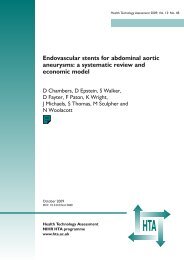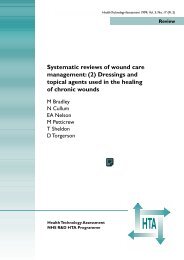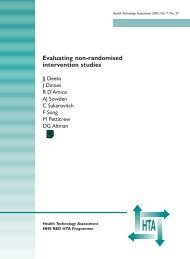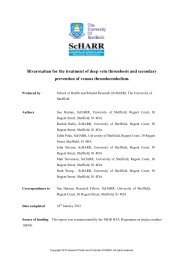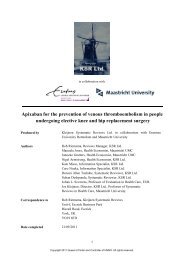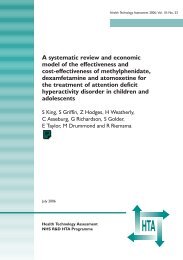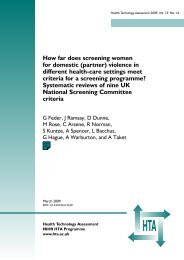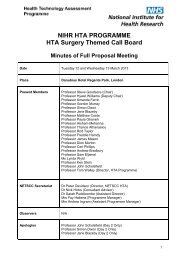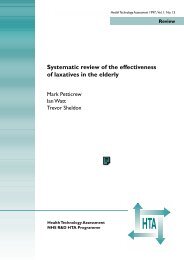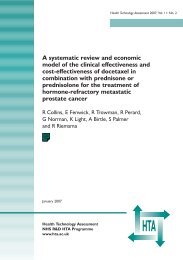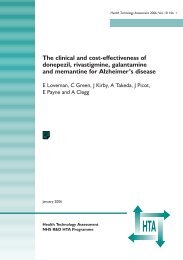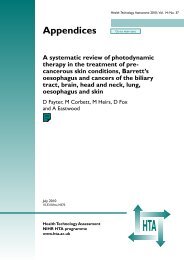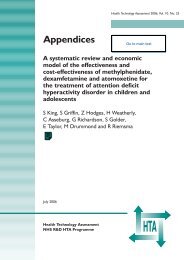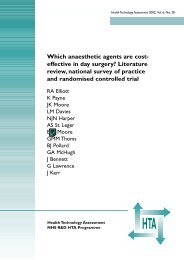Evaluating Patient-Based Outcome Measures - NIHR Health ...
Evaluating Patient-Based Outcome Measures - NIHR Health ...
Evaluating Patient-Based Outcome Measures - NIHR Health ...
Create successful ePaper yourself
Turn your PDF publications into a flip-book with our unique Google optimized e-Paper software.
For trialists selecting a patientbased<br />
outcome measure<br />
We recommend that, on as explicitly stated<br />
grounds as possible, and making use of available<br />
evidence about instruments, outcome measures<br />
for clinical trials should be chosen by evaluating<br />
evidence about instruments in relation to the<br />
following eight criteria: appropriateness, reliability,<br />
validity, responsiveness, precision, interpretability,<br />
acceptability and feasibility. Although underlying<br />
issues have been widely discussed, three of our<br />
criteria, appropriateness, precision and interpretability,<br />
are not always included in lists of desirable<br />
properties of instruments. The remaining five<br />
criteria are widely cited and identified in the<br />
same or similar terminology as in this review.<br />
The selection of instruments on the basis of our<br />
criteria cannot, given the present state of the field,<br />
be a straightforward or mechanical one. This is<br />
partly because there is only a moderate level of<br />
consensus about what exactly is meant by some<br />
criteria. The literature does not provide unambiguous<br />
definitions and advice regarding the issues<br />
we have reviewed. The evidence for any given<br />
instrument will be partial and complex to assimilate.<br />
Above all, the criteria themselves cannot be<br />
weighted or prioritised given the current state<br />
of knowledge.<br />
Investigators need to think of the desirable<br />
properties of outcome measures for a specific<br />
use in a specific trial question. Instruments do<br />
not have properties of being reliable, valid and so<br />
on in some universal sense; they are properties in<br />
relation to a specific use. This makes selection of<br />
instruments a complex process. Investigators need<br />
to select outcomes appropriate to the question<br />
addressed by a trial. Ideally each instrument is<br />
optimally appropriate, valid, reliable and so on,<br />
although, in reality, trials may include combinations<br />
of outcome measures that together have<br />
optimal measurement properties. There are costs<br />
as well as benefits to be considered of following the<br />
advice sometimes offered to include a combination<br />
of generic and disease-specific measures.<br />
Given the incomplete and complex state of<br />
knowledge in this field, it may be advantageous<br />
Chapter 5<br />
Recommendations<br />
<strong>Health</strong> Technology Assessment 1998; Vol. 2: No. 14<br />
for investigators setting up trials to involve<br />
those with expertise in outcomes in trial design<br />
and analysis.<br />
For developers of patient-based<br />
outcome measures<br />
To encourage more appropriate use of outcome<br />
measures, those who develop such instruments<br />
need to provide as clear evidence as possible of<br />
the available evidence of new instruments in terms<br />
of the eight criteria emphasised by this review.<br />
Standards for documentation of patient-based<br />
outcome measures will improve. These developments<br />
will make the task in selecting outcome<br />
measures for trials much more evidence-based.<br />
Future research<br />
In almost all areas reviewed there are substantial<br />
gaps in knowledge and understanding of how<br />
best to capture patients’ perceptions of illness<br />
and outcomes of interventions within clinical<br />
trials. There is therefore a strong case for further<br />
methodological research in relation to patientbased<br />
outcome measures. To facilitate appropriate<br />
selection of instruments for clinical trials, two kinds<br />
of further research in particular are needed. Firstly,<br />
in trials and observational studies, the performance<br />
of patient-based outcome measures should be<br />
directly compared. There are still too few ‘head-on’<br />
comparisons of different types of measures completed<br />
by the same patients within a trial, especially<br />
with regard to the issue of responsiveness. More<br />
such studies are needed either in the form of<br />
additional methodological components of major<br />
clinical trials or as methodological investigations in<br />
their own right. It will then be possible to address<br />
questions such as whether disease-specific, generic<br />
or other kinds of instruments are more responsive<br />
in various clinical contexts. Secondly, researchers<br />
and clinicians in specific areas, oncology, rheumatology,<br />
psychiatry and so on, should carry out<br />
assessments of evidence for the comparative<br />
performance generally of the more widely used<br />
of outcome measures in their field. This process<br />
has begun to happen in some specialties and<br />
publication of such consensus views would<br />
47



